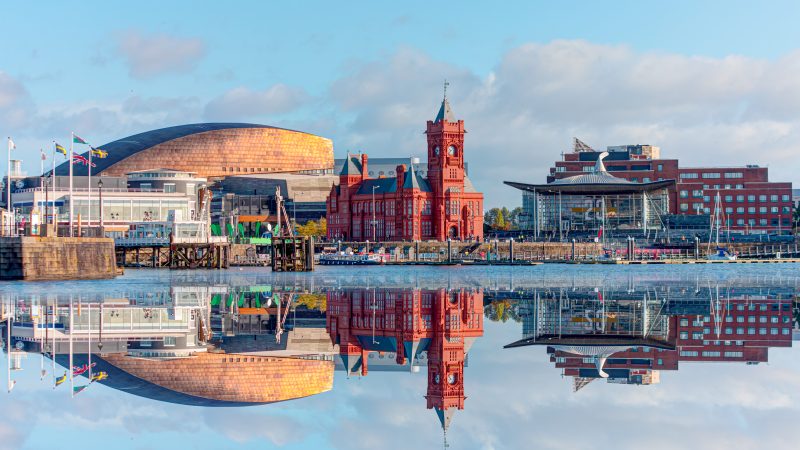
Of all the miracles said to have been performed by patron saints, there can’t have been many described as “superfluous”. That was the description given by Welsh historian John Davies about St David’s miracle of raising a hill beneath himself as he gave a sermon to a crowd in what is now Llandewi Brefi. As Davies rightly pointed out, Wales is a country not lacking in hills, so the creation of a new one does seem unnecessary.
I was reflecting on this story recently as we marked 25 years since we in Wales raised a hill beneath our own feet – and this one was anything but superfluous. In 1997, I campaigned alongside so many others for a ‘yes’ vote in the referendum on devolution for Wales. Winning that referendum paved the way for the Senedd we have today, bringing decisions closer to communities and ensuring a stronger voice for Wales, which we could project from the new hill we had raised.
Now, as economy minister in the Welsh government, a crucial part of my role is bringing Wales to the world, to boost our trade opportunities and the incredible businesses and products that amplify all that is great about our nation.
If you’ve ever travelled on an Airbus jet, you’ve flown on wings made in North Wales. At some point today, whether you are in the kitchen or on a train, you will rely on steel. Port Talbot is the beating heart of a Welsh and UK industry that is good for security and integral to a just transition.
This Easter, if you’re lucky enough to enjoy some Welsh lamb, you’ll be part of a rapidly growing number of people across the world who know the difference between the best lamb there is and the stuff that is produced elsewhere. Exports of our PGI-status Welsh lamb have grown by an incredible 227%, bolstered by our commitment to promoting Wales’ distinctive brand with a focus on quality.
These iconic Welsh exports bring global recognition to Wales. They are backed by a Welsh Labour government with the insights and partnerships needed to promote an authentic, ambitious vision of modern Wales.
As well as making our mark on the world stage, modern Wales is exporting ideas with fresh approaches to strengthening the foundations of the everyday economy. From housing and construction to care and food, we are turning the demand for the everyday economy into new opportunities for better jobs in stronger local businesses.
A stronger, fairer Welsh economy will be built by all of us, which is why we are striving to move positively with the developments that are shaping a changing Wales. The latest census data shows us that Wales is becoming more diverse in terms of race, gender, sexual orientation, religion and spoken languages.
Our anti-racist Wales action plan is now being rolled out, challenging all of government and our partners to proactively bring down the barriers facing so many. Our Business Wales service, for example, is engaging better with diverse communities to increase business start-ups and growth amongst Black, Asian and minority ethnic people.
A new LGBTQ+ action plan, launched last month by Hannah Blythyn, aims to make Wales the most LGBTQ+ friendly nation in Europe. As economy minister, I’ll be working with trade unions and businesses to develop workplace training to help work in Wales become more inclusive and open.
Our First Minister Mark Drakeford stood on a manifesto commitment to expand our ground-breaking approach to tackling violence against women. That means going further to tackle abuse in the workplace, and organisations like the Football Association of Wales (FAW) have shown how powerful and essential it is for men to call this out. I hope more businesses across Wales will join our campaign.
Net Zero Wales will put us at the forefront of work to meet the demands of the climate emergency, with our aim to make Wales a net-zero nation by 2050. The catastrophic threat posed by the climate and nature emergencies means that we must bring people together around a vision that allows Wales to anchor the jobs that we are ideally placed to win. In the short term, I am working with businesses looking for new ways to reduce their energy bills for good and recently launched the green business loan scheme to be delivered by the Development Bank of Wales (DBW), the UK’s first regional bank. Established by the Welsh Labour government – and made possible by devolution – DBW brings a dedicated service that is in touch with and trusted by Welsh businesses.
Our Cymraeg 2050 strategy continues towards our goal of one million Welsh speakers by 2050. It gives confidence to new Welsh speakers like me to use the language and has shown people – whatever their background – that the language belongs to everyone who makes Wales their home. A thriving Welsh language will also help more young people feel positive about planning their future in Wales – a major priority for our economy. I am ambitious about the opportunity to promote this distinctive feature of Welsh life to global audiences, who consistently respond with positive interest based on a respect for minority languages.
National days can get caught up in nostalgia and a hankering for bygone days that aren’t accurately remembered or never truly existed. This St David’s Day, we will celebrate our history and resolve to use the hills raised since 1997 to project a modern nation, as we build a stronger, fairer, greener Wales.




More from LabourList
‘Tackling poverty should be the legacy of Keir Starmer’s government’
‘The High Court judgment brings more uncertainty for the trans community’
‘There are good and bad businesses. Labour needs to be able to explain the difference’